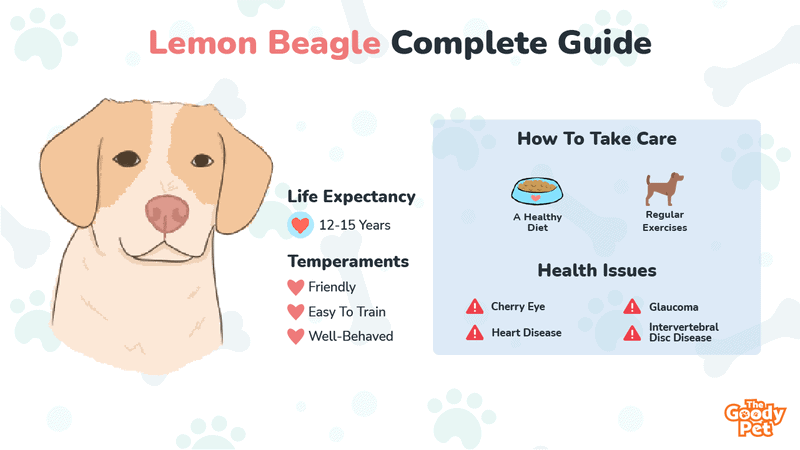Lemon Beagles are exciting dogs. I used to wonder whether they have different grooming patterns from other dogs. As a lucky owner of this furry friend, you may ponder likewise.
Lemon Beagles are purebred Beagles mainly categorized by their distinct white and lemon yellow color. A Lemon Beagle is typically born white, and its tan color gets more pronounced with age.
Notwithstanding, understanding Lemon Beagles is not a complex matter that you should go scurrying about looking for help on how to raise yours. I’m not, however, saying that your Beagle is not important. So, to be able to provide proper care of your Lemon Beagle, you must first have a basic knowledge of their grooming requirements, expected size and weight, dietary requirements and the kind of shampoo you should bathe it with. Carry on reading this comprehensive guide to find out more about your Lemon Beagle.
Are Lemon Beagles Rare?
Lemon Beagles are rare. Therefore, it is very odd and improbable for you to find any in a deserted alley or in a rescue shelter. However, most of their owners know their value and treat them as such.
Lemon Beagles are rare because they are purebred. This means that they come from parents who were both pure Lemon Beagles. Any gene pool not from purebred parents can lead to varying characteristics like different fur colors. And when your Beagle isn’t so “lemony” anymore, the name doesn’t just fit.
Lemon Beagles are lovely doggies. They are intelligent, active and thrilled most of the time. However, several factors are responsible for the rarity of the Beagle.

Size
Well, a typical Lemon Beagle is relatively short and sturdy. They usually grow to about 13 inches and weigh about 25 lbs on average. So why is knowing how heavy a Lemon Beagle is important?
When you know how much your Lemon Beagle is expected to weigh, it will help you to ration its food to reach the ideal amount in feeding your pooch well.
Color
Lemon Beagles have lemon and white-coloured fur that makes them stand out. And although the lemon color is faint at birth, it gets more pronounced as time goes on. Nevertheless, their coloration doesn’t differ as they get older.
Besides the typical black nose, some Lemon Beagles can have a pink or unpigmented nose.
How Long Do Lemon Beagles Live?
A Lemon Beagle typically lives up to 12 to 15 years.
Apart from its color and weight, there are other critical aspects to a Beagle’s life, especially its physiology. You may wonder whether there are any specific or general health issues Lemon Beagles face.
Dogs, in general, are prone to many diseases ranging from Rabies to Arthritis. Nevertheless, Lemon Beagles have specific conditions that may not necessarily be among dogs’ common health issues. Some of these diseases include the following:
Cherry Eye
Cherry eye is a disease that occurs when one of your Lemon Beagle’s eyelids gets inflamed on one or both eyes. Its most recognizable symptom is a small drooping red sac protruding from the tear ducts of your Beagle.

Intervertebral Disc Disease
Intervertebral discs in dogs are tissues located in their spines between vertebral bones, which absorb shock and wear. As time goes on, these discs harden and tend to move out of place, either bulging or compressing.
These bulges or compressions could be on your Beagle’s neck down to its tail. And being abnormally placed could impair your canine’s nerve impulses and lead to other issues.
Glaucoma
Glaucoma affects other dogs too, but Lemon Beagles are more predisposed to the disease. It is caused by intraocular pressure or Uveitis in your Beagle’s eyes. It can cause your dog a lot of pain and blurry or impaired vision.
Heart Disease
This disease is relatively common in dogs. But especially in Beagles. It happens when your canine’s heart cannot pump blood around its body as generally as it should, which can lead to death.
The good thing with these diseases is that as long as they are diagnosed early by a professional vet, you can save your Lemon Beagle from long-term health complications and death.
How To Take Care Of Your Lemon Beagle?
There are three key aspects to consider in ensuring that your Lemon Beagle is well taken care of. They are:
- Feeding
- Exercise
- Healthcare
Feeding
Nutrition is an integral part of your Beagle’s life. Your furry friend’s diet is a significant determinant of how healthy it’ll be. If you have a puppy that weighs about 10 lbs, you should give it no more than 2 cups of healthy food per day. Pet Plate is a perfect option for your dog as it is loaded with the nutrients your Beagle needs to grow well.
Nursing Beagle dams usually require more food than regular Lemon Beagle adults. Supplements, like multivitamins, come in handy when your dog’s feed doesn’t have certain nutrients it needs. Adding them in small quantities to its feed from time to time will prevent deficiency diseases.
Exercise
To keep your dog active and healthy, you’ll need to take it on walks. Exercise helps to keep your buddy alert and helps to reduce the occurrence of heart disease. So, at least five times a week, take your Lemon Beagle on a walk. Over time, it will even anticipate these walks.
Healthcare
It will certainly help if you take your Lemon Beagle on regular visits to the vet. Your pooch, however, may dislike these visits, especially as it is going to get some shots from time to time. Such medical procedures are very beneficial in keeping your Lemon Beagle healthy.
In turn, your dog can avoid some diseases, like periodontal ones. You should also consider using dental water additives or get a vet prescription for such additives, as it helps to eliminate bacteria in the water and in your dog’s mouth, thereby improving the overall oral health of your Lemon Beagle.
Are Lemon Beagles Easy To Train? Temperaments Of Lemon Beagles
Most Lemon Beagles are well-behaved and very friendly in nature. They take very little time to be trained to adapt to their owners and other pets they are introduced to.
However, for its safety, it will be best not to let your Beagle get too close to an aggressive dog. Some dogs tend to be ill-tempered, and can be pretty hard to train and be domesticated.
Cannot Be Left Alone For Long Hours
Lemon Beagles don’t like being left alone for long. An adult Lemon Beagle (over 18 months) shouldn’t be left on its own for more than 4 to 6 hours daily, while pups shouldn’t be left unsupervised for more than 2 hours.
When you keep ignoring yours, it could get used to your lack of attention. You may regret neglecting your Lemon Beagle in the long run.

Training Method For Lemon Beagles
Lemon Beagles tend to be independent and do not respond well to typical training techniques. However, with treats as a form of positive reinforcement, you can motivate your Beagle to do almost anything.
Whenever you want to teach your canine friend anything new, ensure you have a treat in hand. Keep rewarding it for rolling over, giving a handshake, sitting up or doing any other thing you’re teaching it. Over time, it won’t even need rewards to do these.
Are Lemon Beagles Lazy?
How you engage your Lemon Beagle will in turn impact its attitude. If you keep taking your dog on walks and playing with it regularly to keep it active, it will get used to excitement and does not exhibit a laid-back attitude.
If you engage your Lemon Beagle with fewer or no outdoor activities, your pooch will end up lazing around most of the day. The risk of heart diseases happening to a lazy Beagle will be much higher.
Are Lemon Beagles Low-Maintenance? Grooming Tips For Lemon Beagles
Your Lemon Beagle is not a low-maintenance dog. All dogs, including Lemon Beagles, require a minimal level of maintenance from their owners.
It’s not odd that you probably ponder why Beagles are not low-maintenance dogs.
Shedding Level
Lemon Beagles are not low shedders. They are moderate shedders, which means that yours will shed a small amount of fur everyday. However, during a change in season, it will shed most or all of its fur at once to adapt.
To reduce its shedding, you will need to brush your dog’s fur regularly. The Furminator Undercoat Tool is a highly recommended brushing tool you can use to deshed your Lemon Beagle.
While Lemon Beagles cannot be classified as low-maintenance dogs, they don’t require as much care as other dogs. Taking adequate hygienic measures on your dog will ensure it stays healthy and clean.
Remember to regularly check your canine’s fur for any ectoparasites such as ticks. They could pose a threat to your dog’s well-being if they aren’t controlled on time.
Bathing
It will certainly help if you bathe your Beagle as often as once every month. However, If your dog spends its time mostly indoors, there is no need for you to bathe it regularly. Since Beagles have relatively little fur, they don’t get dirty quickly. But after a long walk in muddy soil, your dog will need to be washed down.
Nevertheless, it would be best if you used a non-acidic shampoo for your dog when it needs a bath. Pro Pet Works All Natural 5 In 1 Oatmeal Shampoo is a great shampoo option containing the oatmeal ingredient that helps soothe Lemon Beagles with sensitive skin.
Related Questions
What Do Lemon Beagle Puppies Cost? Lemon Beagles typically cost between $500 to $1,300. This relatively high cost stems from the fact that they are purebred Beagles. Generally, dirty-lemon colored Beagles cost less than those with light lemon furs. Those with irregular spots are often cheaper too. But near-albino Beagles are the most expensive.
Can Lemon Beagles Swim? Yes, Lemon Beagles can swim. They, however, do not like swimming as it is an exhausting activity, and they don’t like being in the water. Never force your dog to swim, and always supervise it when it does. Doing this will help you avoid any drowning accidents.
Can Lemon Beagles Eat Lemons? No, Lemon Beagles cannot eat lemons because of the sour citric compounds that are acidic in nature and toxic to these dogs if consumed in large amounts, potentially leading to their deaths. Although Lemon Beagles bear the fruit as part of their names, it does not imply that they can eat a lemon in large quantities. Lemons are also found to contain aromatic oils, which can be toxic to dogs.





